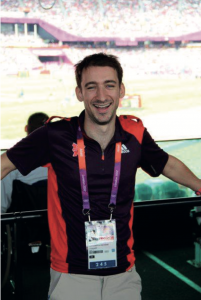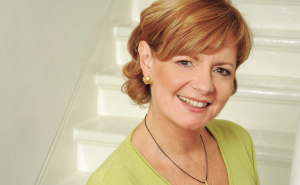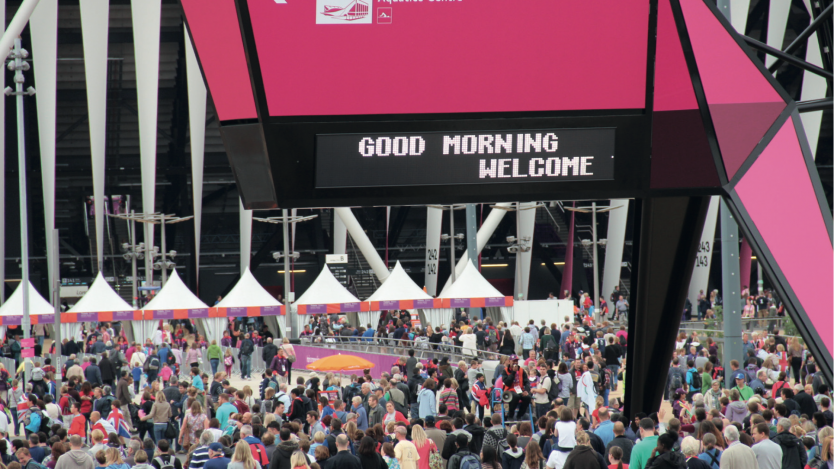Linda Moir, who was leader of the London Olympic and Paralympic Games Makers and Virgin Atlantic’s Director of In Flight Services, reveals how you can make your customers happy.
Put the customer first. It’s a mantra trotted out so frequently by businesses it’s almost become a stereotype. But if you base your principles on delivering outstanding customer service, you can enjoy spectacular results.
Just look at the career of Linda Moir. She was hired by Sir Richard Branson in 2003 to ‘make flying fun’ at Virgin Atlantic and transformed their operation and reputation. Virgin’s customer service was award winning, and saw significant business growth, based on the promise of ‘Brilliant Basics, Magic Touches.’
 She then led the 15,000 Games Makers that turned the Olympic and Paralympic Games in London in 2012 into one of the most successful in history.
She then led the 15,000 Games Makers that turned the Olympic and Paralympic Games in London in 2012 into one of the most successful in history.
The Games Makers were an absolutely pivotal part of that – the first point of contact for spectators making their way into the venues and creating the wonderful atmosphere that captivated the capital over that summer.
Linda has enjoyed unparalleled success in HR and customer service and here are her guiding principles…
How do we deliver outstanding customer service?
Two things I’ve learned during all my career, but particularly at Virgin and which I tried to put in practice at the Olympic Games, was that, first of all, it is your people that deliver great customer service and you are only as good as the weakest link in that chain.
You might have some very grand ideas – in the case of Virgin it was the quality of our seats and our meals – but if you have got someone grumpy delivering that service then it is not going to work.
The second thing, and it is really important and sounds very obvious but not too many do it, is to walk in the shoes of the customer.
You only really understand what issues the customer faces when you literally walk through the customer journey step by step and understand where the journey works, really works and where the weak points are.
That’s how I would start. Often, organisations focus on their product. In the case of golf club managers, it’s the quality of the course or the quality of the leisure facilities. That’s very important but, for me, it is just as important to focus on the human wrap that goes round those products.
Virgin Business Class was top end £ wise, but what did they do differently to set themselves apart?
Virgin Business Class – called Upper Class – was high end. When I was there we launched at bed seats in business class. Three months later, Singapore Airlines came up with something better. They were wider, the pillows were squidgier, and so on. They beat us.
But we had wrapped our service round the product so we beat them in terms of overall recognition. That all came down to the crew being really clear about what they had to do.
It’s what we called our ‘Brilliant Basics.’They had the freedom to deliver magical touches and go and enjoy themselves. That’s how Virgin service became known for warmth, cheekiness and friendliness.
Our rivals were very professional but lacked authenticity.
 What can we learn from the Olympics, where you worked with people who weren’t being paid?
What can we learn from the Olympics, where you worked with people who weren’t being paid?
That sense of pride is so important to delivering great service.
You can’t tell people to be proud. You have to encourage them and give them that opportunity to be proud of what they are doing.
When I got this sizeable job to lead the spectator experience at the Olympic Games, I knew I had nine million spectators and 15,000 volunteers.
I am not a proud person and I went to ask the team who ran the Sydney Games in 2000. Everybody had said that Olympic Games couldn’t be beaten in terms of the atmosphere and friendliness.
They said there were three golden rules for engaging volunteers…
- People like being busy. If you have volunteers turn up for their opportunity and say ‘there is nothing for you at the moment, go have a cup of tea and come back in an hour’, they can really switch off.
- Rotate people and give them a lot of different tasks. What I learned at the London Games is never underestimate their appetite and energy for learning – at any age. We made sure our volunteers did a lot of different jobs and moved them round all the time and that made an enormous difference.
- Reward and recognition.This is not about money. It is about team leaders saying ‘thank you.’ It is about very small tokens of recognition. We gave out a lot of badges and shift gifts. That’s so important in building that sense of pride.
Those were our three main rules to build pride and recognition.
 Why is customer service important?
Why is customer service important?
As consumers, we all have phenomenal choice. If I have a bad experience I don’t just tell my nearest and dearest, I tell the world.
My children, if they are unhappy with a service experience, don’t think about phoning up or writing a letter. They are on Twitter or put something on Instagram and they tell the world.
Customer service is more important than ever and getting it right is more important than ever. Customers are more demanding than ever.
What’s the biggest mistake people make when delivering customer service?
The biggest I have observed people making is that they focus on their product and don’t think about the service or the people.
I have worked with a lot of organisations who are really proud when they have managed to improve something for the customer, they launch it and then they don’t engage or collaborate with their people – and it could be so much better.
As managers, don’t think you know it all because you probably don’t.
Linda Moir will be delivering the opening keynote presentation of the 2017 GCMA Conference – Driving a memorable customer experience – on Monday, November 13. Book your place today.
By GCMA



